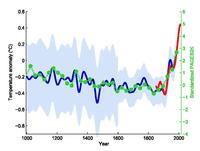
Photo from wikipedia
The multivariate adaptive regression splines (MARS) model is a flexible non-parametric sparse regression algorithm and provides an excellent promise to data fitting through nonlinear basis functions. During the last decades,… Click to show full abstract
The multivariate adaptive regression splines (MARS) model is a flexible non-parametric sparse regression algorithm and provides an excellent promise to data fitting through nonlinear basis functions. During the last decades, it is employed in many fields of control design, finance, technology, and science. It can be regarded as an extension of linear models that automatically model interactions and nonlinearities. The least absolute shrinkage and selection operator (LASSO) analysis is a variable selection and shrinkage method to linear regression models. It proposes to construct the subset of explanatory variables which minimizes estimation error to a quantitative dependent variable. LASSO is applied to choose the variables and perform the regularization to improve the interpretability and robustness of the model. In this paper, we examine MARS and LASSO to generate natural gas demand forecasts of residential users for the distribution system operators who need both short- and long-term forecasts. We also compare the performance of MARS and LASSO with a simple multiple-linear regression (LR) commonly used in practice. Our analysis reveals that MARS outperforms LASSO and LR in both the average measures and in the worst-case analysis. For 1 day-ahead forecast, MARS provides a MAPE of around 4.8% while the same figure under LASSO and LR reaches 8.3 and 8.5% respectively. However, as the forecasting horizon increases, we observe that the performance of these proposed methods gets worse and for 1 year-ahead forecast, the MAPE values for MARS, LASSO, and LR are 13.4%, 24.8% and 26.3% respectively.
Journal Title: Annals of Operations Research
Year Published: 2021
Link to full text (if available)
Share on Social Media: Sign Up to like & get
recommendations!